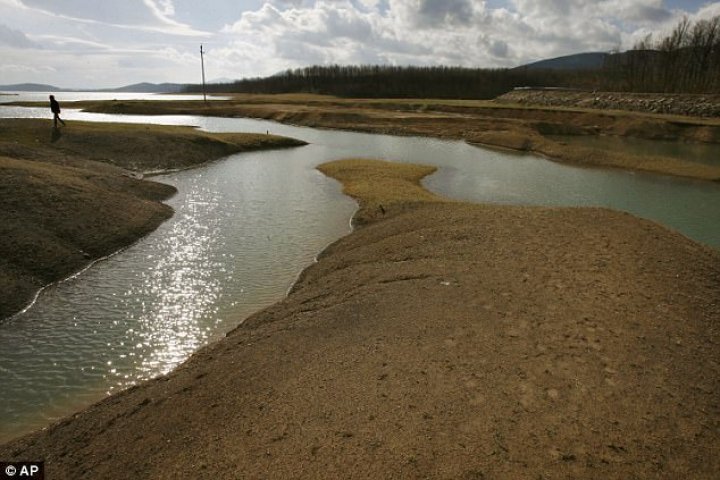Cape Town faces 'Day Zero' when taps will be turned off as South Africa is hit by severe
The vista could hardly be more barren or forbidding – a parched sandy landscape, baking beneath the afternoon sun, broken only by scarred trunks of long-dead trees and a few dried-up fish. Ruined houses, scraps of road and a rail track are the only signs of humanity, haunting remnants of long-disappeared lives.
In normal circumstances, these relics would be hidden from view. For this desert-scape where I am walking does not lie in some arid wasteland. It sits in the middle of what was, until recently, a massive reservoir that held the precious lifeblood of a major modern city.
Those trees and houses and rail tracks should lie submerged beneath almost 50ft of glistening water. But the waters have receded, exposing the valley floor.
‘Every day you see something new emerge from the water,’ says Jacques Dreyer, a local sports club manager, pointing out white lines still visible on a road that was under water for four decades until last week.

Dreyer used to enjoy life at the water’s edge, taking a daily dip just 20 yards from his door. Now he must travel a mile and a half for a swim while his boats are banked, his campsites largely empty and his business struggling.
But this is not just one man’s tragedy, it is a national emergency – and one with chilling implications for the whole planet.
This vast dammed reservoir, surrounded by stunning mountains, supplies almost two-thirds of the water for Cape Town, a city of four million people at the fertile centre of South African agriculture. Produce from surrounding fields and orchards helps fill British supermarket shelves with fruit and vegetables all year round.
Yet it is only at 11.7 per cent capacity after the region’s worst drought in more than a century. Some time soon, perhaps this week, the water will drop below the level it needs to be to flow into the supply pipes that take it into the city.
Africa’s tenth biggest city is facing an unprecedented crisis. Rigid water restrictions on businesses, farms and households have helped hold disaster at bay – but it may not be enough.
For the moment called ‘Day Zero’ is approaching. This is when most taps will be turned off and residents will have to queue at 200 standpipes installed in streets for diminishing water supplies. If insufficient rain falls when their winter arrives to replenish key water supplies, Cape Town has just over 100 days left before that fateful day arrives.
The authorities in a conurbation scarred by extreme inequality are scrambling to prepare disaster plans for disease epidemics and urban unrest.

Businesses are drawing up survival plans, with jobs already disappearing in their thousands.
There are even predictions of an exodus of families used to living in a fully-functioning city – and claims that this disaster is the first urban equivalent of droughts that before now only blighted rural parts of this continent.
No one knows what would happen if a major urban area ran out of water, but one expert talked to me about ‘Mad Max’ scenarios with roaming gangs on the streets.
‘This situation is far more serious than people realise,’ said Benoit Le Roy, a water analyst. ‘Even in a war zone you can usually get water. If there is not enough water, unemployment will increase and the army will need to keep the peace.’

Read more on dailymail.co.uk.
 foto: dailymail
foto: dailymail



